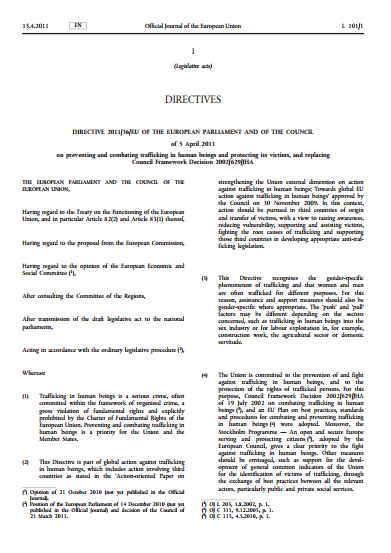Directive 2011/36/EU of the European Parliament and of the Council of 5 April 2011 on preventing and combating trafficking in human beings and protecting its victims, and replacing Council Framework Decision 2002/629/JHA
The European Commission welcomes the publication on 5 April 2011 of the new EU Directive 2011/36/EU on prevention and combating trafficking in human beings and protecting its victims in the Official Journal of the European Union (OJ L 101, 1 15.4.2011). The adoption follows a Commission Directive proposal last spring, with binding legislation to prevent trafficking, to effectively prosecute criminals, and to better protect the victims, in line with the highest European standards.
“This is a very important step towards a comprehensive and more effective European anti-trafficking policy. I would like to thank the Council and the European Parliament for the swift adoption of this directive. The new ambitious rules adopted today will keep the EU at the forefront of the international fight against human trafficking by protecting the victims and punishing the criminals behind this modern slavery“, said Cecilia Malmström, Commissioner for Home Affairs.
The Directive takes a victim-centred approach, including a gender perspective, to cover actions in different areas such as criminal law provisions, prosecution of offenders, victims’ support and victims’ rights in criminal proceedings, prevention and monitoring of the implementation.
See the Directive 2011/36/EU online in 23 languages here.

